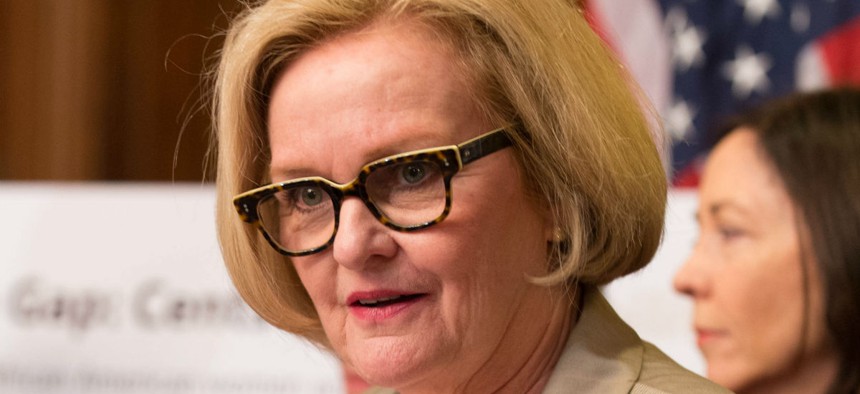
Sen. Claire McCaskill, D-Mo., called the report jaw dropping. Flickr user Senator Claire McCaskill
Watchdog Ridicules Pentagon’s $43M Gas Station in Afghanistan, Calling it Exorbitant
Special inspector general also accuses Defense officials of hindering investigation.
Shocking, incredible, exorbitant. Those were the hardly routine words deployed by an inspector general in a report released Monday blasting the Defense Department for spending $43 million on a compressed natural gas automobile filling station in Afghanistan.
A similar station in neighboring Pakistan cost only $500,000, the special inspector general for Afghanistan reconstruction said in a letter to Defense Secretary Ash Carter. Top auditor John Sopko also complained that Pentagon officials working on rebuilding the economy of the war-torn country threw roadblocks in front of SIGAR investigators and claimed to have no knowledge of how the cost overruns occurred.
The DoD’s Task Force for Stability and Business Operations, with an $800 million budget, in 2011 inked a $3 million contract with a firm called Central Asian Engineering. Its chief purpose was constructing Afghanistan’s first compressed fueling station, which would include two dispensers, four hoses, one trailer filling point, a car conversion center, an administrative office building, and gas compression and processing equipment.
The project was also designed to prove that there is an interest on the part of the Afghan government in compressed fuel to reassure investors and create a market value for the station while adding expertise to the government’s Ministry of Mines and Petroleum.
“No evidence exists that [the Defense task force] conducted a feasibility study before spending $43 million on the station,” the report said. “If [the task force] had conducted a feasibility study of the project, they might have noted that Afghanistan lacks the natural gas transmission and local distribution infrastructure necessary to support a viable market for [compressed natural gas] vehicles. Additionally, it appears that the cost of converting a car to run on CNG may be prohibitive for the average Afghan.”
Brian P. McKeon, principal deputy undersecretary of Defense for policy, twice told SIGAR that the department no longer had personnel to answer questions about the fuel station, adding that SIGAR had not availed itself of offered access to relevant records. SIGAR disputed that assertion, saying it pursued a meeting to gain access and will continue to do so.
Sen. Claire McCaskill, D-Mo., on Monday released a statement decrying the “outrageous, wasteful” construction of the $43 million alternative fuel station. “There are few things in this job that literally make my jaw drop,” said McCaskill, a member of the Armed Services Committee. “But of all the examples of wasteful projects in Iraq and Afghanistan that the Pentagon began prior to our wartime contracting reforms, this genuinely shocked me. … Perhaps equally outrageous, however, is that the Pentagon has apparently shirked its responsibility to fully account for the taxpayer money that’s been wasted—an unacceptable lack of transparency that I’ll be thoroughly investigating.”
(Image via Flickr user Senator Claire McCaskill)







